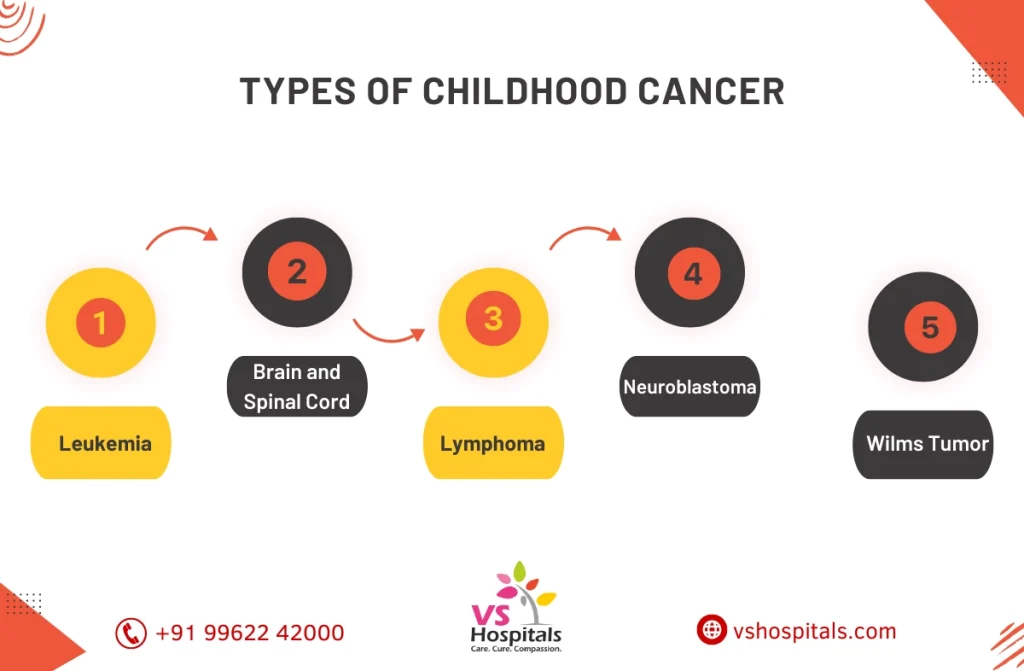Pediatric oncology focuses on diagnosing and treating cancers in children, from infants to young adults. This specialized field addresses cancers that behave uniquely in young patients, requiring a compassionate, tailored approach. At VS Hospitals, our pediatric oncology team is dedicated to providing advanced treatments and holistic care, combining medical expertise with emotional support for both children and their families. We strive to offer hope and healing, guiding young patients through every stage of their cancer journey.

What Is Pediatric Oncology?
Pediatric oncology is a medical specialty dedicated to diagnosing and treating cancers in children, from infancy through adolescence. Unlike adult cancers, childhood cancers are often fast-growing and may require unique treatment approaches. Pediatric oncologists specialize in understanding how cancer affects young, developing bodies, ensuring that treatments are both effective and gentle.
- Pediatric Oncology Meaning: Focuses on cancer care for young patients.
- Unique Approach: Tailored treatments addressing specific needs of children.
- Comprehensive Care: Covers diagnosis, treatment, follow-up, and family support.
At VS Hospitals, we provide expert pediatric oncology in India, focusing on personalized care to improve outcomes and quality of life.
Types of Childhood Cancer
Pediatric oncology covers a range of cancers that are unique to children, requiring specialized treatment approaches. Understanding the different types of childhood cancers helps families and healthcare providers choose the most effective care. Here are some of the most common types encountered in pediatric oncology:
- Leukemia: The most common form of childhood cancer, affecting the blood and bone marrow.
- Brain and Spinal Cord Tumors: Tumors that develop in the central nervous system, often impacting cognitive and physical development.
- Lymphoma: Cancer of the lymphatic system, affecting immune cells.
- Neuroblastoma: Typically starts in immature nerve cells, often in young children.
- Wilms Tumor: A kidney cancer primarily affecting children under five.
At VS Hospitals, we provide targeted care for each type, ensuring comprehensive pediatric oncology support across India.
Treating Childhood Cancer
Treating childhood cancer involves a comprehensive approach that balances effective cancer treatment with a focus on the overall well-being of young patients. Pediatric oncology specialists at VS Hospitals provide customized treatment plans to suit each child’s unique needs. With the goal of achieving the best possible outcomes, our pediatric oncology in India combines advanced therapies with supportive care.
Key treatment components include:
- Personalized Treatment Plans: Tailored to each child’s cancer type and stage.
- Multidisciplinary Team: Includes pediatric oncologists, hematologists, and support staff.
- Emotional and Family Support: Care extends beyond the physical, addressing emotional needs.
VS Hospitals is dedicated to guiding families through this journey with compassion and expertise.
Types of Treatment
In pediatric oncology, treatment options are carefully chosen based on the type and stage of cancer, as well as each child’s unique needs. At VS Hospitals, we provide a range of advanced treatments, combining multiple approaches for the best possible outcomes.
- Surgery: Removes tumors directly and is often used in solid cancers.
- Chemotherapy: Uses powerful drugs to target and destroy cancer cells.
- Radiation Therapy: High-energy rays to kill or shrink cancer cells.
- Immunotherapy: Strengthens the child’s immune system to fight cancer.
- Stem Cell Transplant: Replaces damaged bone marrow to support recovery.
These pediatric oncology treatments at VS Hospitals prioritize both effectiveness and minimizing side effects.
Childhood Cancer: Risk Factors
Understanding the risk factors associated with childhood cancer can help in early detection and prevention. Pediatric oncology research shows that while many cancers in children occur spontaneously, some factors can increase the likelihood of developing cancer. Here are key risk factors identified in pediatric oncology:
- Genetic Factors: Certain inherited genes may predispose children to cancer.
- Family History: A family history of specific cancers can raise the risk.
- Genetic Syndromes: Conditions like Down syndrome and Li-Fraumeni syndrome may elevate cancer risk.
- Radiation Exposure: Prior radiation treatments for other conditions or accidental exposure can increase cancer risk.
- Immune System Suppression: A weakened immune system makes children more vulnerable.
- Medications and Drugs: Some drugs may lead to higher cancer susceptibility in children.
At VS Hospitals, our pediatric oncology team emphasizes awareness and early screenings, especially for children at higher risk.
Pediatric Cancer: Prevention and Cure
While some childhood cancers are unpreventable, certain practices can lower risks and promote healthier lives. At VS Hospitals, our pediatric oncology team emphasizes preventive care and education to help families take proactive steps.
- Vaccinations: Immunizations like HPV and hepatitis B vaccines help reduce certain cancer risks.
- Healthy Lifestyle: A balanced diet rich in fruits, vegetables, and whole grains strengthens the immune system.
- Sun Protection: Shielding children from excessive sun exposure can prevent skin cancers.
- Avoid Tobacco and Smoke Exposure: Protecting children from secondhand smoke can lower cancer risks.
- Regular Check-ups: Routine medical visits enable early detection, supporting better outcomes.
VS Hospitals’ pediatric oncology specialists support families with information and care plans to promote prevention and wellness.
Conclusion
Pediatric oncology is a field that blends challenges with hope, offering specialized care for children facing cancer. At VS Hospitals, our commitment is to provide compassionate, comprehensive treatment tailored to each child’s unique needs. Our pediatric oncology team supports young patients and their families through diagnosis, treatment, and recovery, ensuring they feel guided every step of the way. With our expertise and dedication, we aim to bring comfort, healing, and the best possible outcomes for every child in our care.
